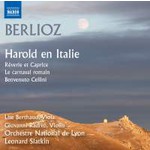
Berlioz: Harold en Italie, Op. 16 / Reverie et Caprice, Op. 8 / Overtures
 $25.00
Out of Stock
$25.00
Out of Stock6+ weeks add to cart
HECTOR BERLIOZ
Berlioz: Harold en Italie, Op. 16 / Reverie et Caprice, Op. 8 / Overtures
Lisa Berthaud (viola) & Giovanni Radivo (violin) / Orchestre National de Lyon, Leonard Slatkin
[ Naxos / CD ]
Release Date: Sunday 10 August 2014
This item is currently out of stock. It may take 6 or more weeks to obtain from when you place your order as this is a specialist product.
Drawing on the adventures of Byron's Childe Harold and the composer's own Italian experiences as a Prix de Rome winner, Harold en Italie was intended for the great violinist Paganini who, having initially rejected the work, later repented, giving it his highest praise. The brilliant concert overtures Benvenuto Cellini and Le carnaval romain are among Berlioz's most popular works. Quickly taken up by several celebrated violinists of the time, the elegant Rêverie et Caprice is his only work for solo violin and orchestra. Leonard Slatkin's Lyon recording of Berlioz's Symphonie fantastique (8572886) has been acclaimed as "quite simply one of the best on disc" by MusicWeb International.
Leonard Slatkin and the Orchestre National de Lyon have already booked a remarkable success with their Grammy nominated recording of Berlioz's Symphonie fantastique (8572886), which was also a MusicWeb International 'Recording of the Month'. It was also dubbed "the most amazing performance and recording of the work I've ever heard" by Fanfare.
Internationally renowned conductor Leonard Slatkin is currently music director of the Detroit Symphony Orchestra and of the Orchestre National de Lyon and principal guest conductor of the Pittsburgh Symphony Orchestra. He is also the author of a new book entitled Conducting Business. His more than 100 recordings have brought seven GRAMMY® Awards and 64 GRAMMY® Award nominations. He has received many other honours, including the 2003 National Medal of Arts, France's Chevalier of the Legion of Honour and the League of American Orchestras' Gold Baton for service to American music.
"here [Harold] comes across as a winner...The Lyon orchestra luxuriates in Berlioz's instrumental colours, and the fillers include swaggering renditions of the Benvenuto Cellini and Roman Carnival overtures." (Financial Times)
"The recording, as in the case of the previous Symphonie fantastique, is superb. Despite the fact that we are told that the performances were "recorded live" there is no sign of any audience presence, not even applause at the end of items. Applause would have been well deserved. The balance throughout is truthful, as I have indicated, and the offstage strings at the end of Harold (track 4, 10.29) have just the right sense of mysterious distance." (MusicWeb Sept 2014)
Tracks:
Harold en Italie, Op. 16
Reverie et Caprice, Op. 8
Le carnaval romain Overture, Op. 9
Benvenuto Cellini Overture